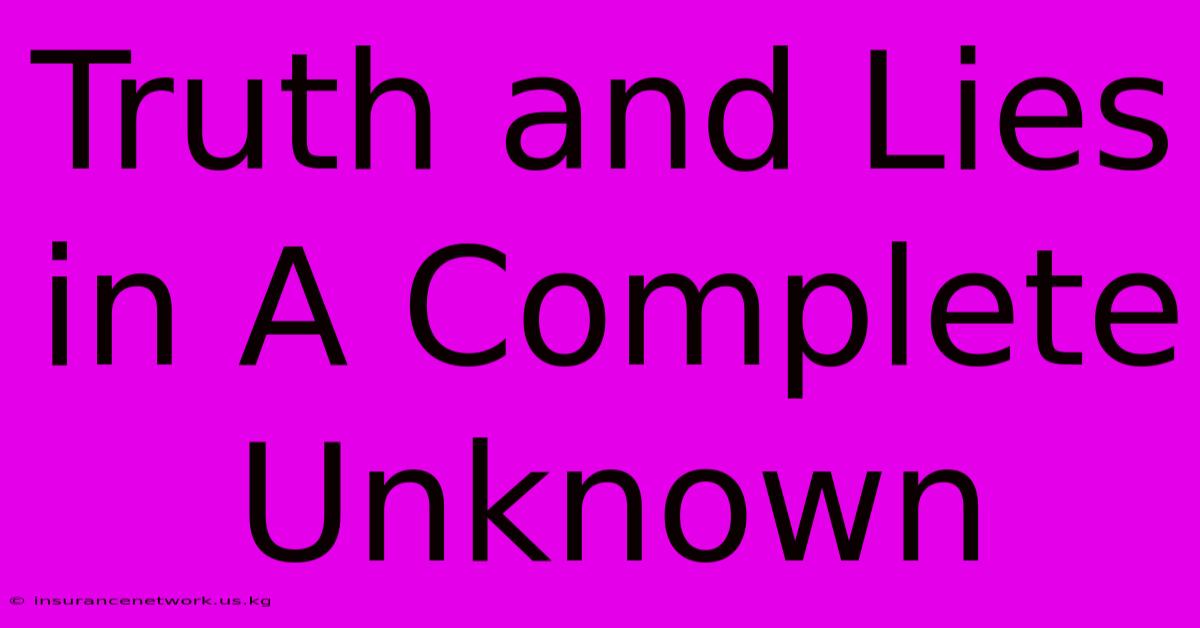Truth And Lies In A Complete Unknown

Discover more detailed and exciting information on our website. Click the link below to start your adventure: Visit Best Website insurancenetwork.us.kg. Don't miss out!
Table of Contents
Truth and Lies in A Completely Unknown World: Navigating Deception and Uncertainty
The human experience is a constant negotiation between truth and lies, a complex dance played out in every interaction, every decision, and every relationship. But what happens when the very foundation of our reality is shrouded in mystery, when we find ourselves in a completely unknown world? The stakes are heightened, the lines blur, and the search for truth becomes a desperate, often perilous, quest.
The Allure of the Unknown: Why We Crave Mystery
Humans are inherently curious creatures. We're drawn to the enigmatic, the unexplained, the completely unknown. This innate curiosity fuels our explorations, whether it's venturing into uncharted territories or delving into the depths of our own minds. But this fascination with the unknown also makes us vulnerable. We're more susceptible to deception when our understanding is limited, when our perceptions are clouded by uncertainty.
The Power of Suggestion in Unfamiliar Settings
In an unfamiliar environment, our senses are heightened, and we're more likely to rely on external cues and suggestions. This makes us susceptible to manipulation. A seemingly harmless gesture could conceal a sinister intent, a whispered rumor could unravel our carefully constructed reality. The lack of context amplifies the impact of even the smallest details, transforming innocent actions into potentially threatening ones.
Unraveling Deception: Strategies for Identifying Lies
Navigating a world where truth is elusive requires a keen eye for detail and a healthy dose of skepticism. While there's no foolproof method for detecting lies, several strategies can help you separate fact from fiction in the completely unknown:
1. Observe Body Language:
Nonverbal cues often betray a speaker's true intentions. Inconsistent body language, such as nervous fidgeting or avoiding eye contact, might signal deception. However, remember that cultural norms can influence body language, so context is crucial.
2. Analyze Verbal Cues:
Pay attention to inconsistencies in a person's story. Are there contradictions or evasions? Do they hesitate before answering questions? Do their answers seem overly rehearsed or lacking in detail?
3. Verify Information:
Whenever possible, corroborate information from multiple sources. Don't rely on a single account, especially in a completely unknown setting where trust is a fragile commodity.
4. Trust Your Intuition:
Your gut feeling can often be a reliable indicator. If something feels off, don't dismiss it. Investigate your concerns, even if it means questioning what initially seemed to be a harmless assumption.
The Ethical Implications of Deception in the Unknown
The ethical considerations surrounding truth and lies are complex, especially when navigating an unknown world. While deception might seem necessary for survival in certain circumstances, it's essential to carefully consider the potential consequences. A lie, even one told with good intentions, can have far-reaching repercussions, eroding trust and creating a climate of suspicion.
Embracing Uncertainty: The Path to Truth
Ultimately, the search for truth in a completely unknown world is an ongoing process. It requires courage, resilience, and a willingness to embrace uncertainty. It's about questioning assumptions, challenging established beliefs, and constantly seeking to expand our understanding. It's a journey filled with obstacles and setbacks, but the reward—the uncovering of truth—makes the struggle worthwhile.
Keywords: Truth, Lies, Unknown World, Deception, Uncertainty, Survival, Intuition, Body Language, Verbal Cues, Ethical Implications, Mystery, Exploration, Curiosity, Navigating Deception, Unfamiliar Settings, Information Verification.

Thank you for visiting our website wich cover about Truth And Lies In A Complete Unknown. We hope the information provided has been useful to you. Feel free to contact us if you have any questions or need further assistance. See you next time and dont miss to bookmark.
Featured Posts
-
Nfl Refs Controversial Xavier Worthy Hit
Dec 26, 2024
-
Ravens Texans Live Score Updates
Dec 26, 2024
-
Swift Skips Chiefs Steelers Game
Dec 26, 2024
-
Dulce Singer Dies Aged 69
Dec 26, 2024
-
Mariah Carey Starts Netflix Nfl Christmas Show
Dec 26, 2024
